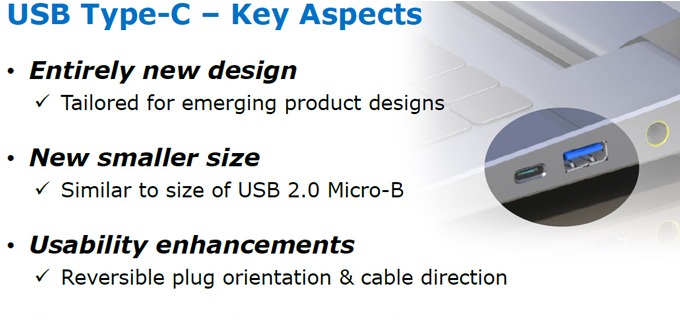This year, USB 3.1 was one of the hottest topics at CES. Many vendors praised the performance of the new, reversible connector. Though shipping the actual hardware is still months away, early performance data looks solid, especially if we consider that third-party controllers usually improve over time.
Asmedia, Anandtech and MSI have teamed up and benchmarked USB 3.1, comparing it with other third-party alternatives, such as VIA and Intel’s solutions. Though the results vary, many metrics are rather impressive, especially when it comes to comparing the random read performance between USB 3.1 Asmedia and Intel’s USB 3.0 performance.
Though the VIA controller performs quite well, USB 3.1 is still 27% faster when compared. And if we get to compare it with Intel, it is 1.7 times faster. When it comes down to a real-world file copy test, Asmedia USB 3.1 controllers are capable of completing the work in 75% of the time required by the integrated USB 3.0 controller provided by Intel, and 50% of the time required by VIA’s solution. Intel has come up with solutions that reach 800MB/s in RAID when connected via USB 3.1. However, the early hardware provided by Anandtech is capable of hitting 650-700MB/s during similar testing. In general terms, the controllers provided by Intel usually outwork third party controllers (at least for a certain standard). However, they also take more time to ship — and it is still unclear when Intel will actually add USB 3.1.
If we look back to USB 3.0, we will notice that Intel was extremely late to tack on direct chipset support to the new standard. The company needed almost three years to develop its own USB 3.0 alternative after motherboards started to be delivered with third-party controllers back in 2009. Back then, people were tempted to believe that Intel was hoping to replace USB 3.0 with Thunderbolt (i.e. mainstream peripheral interconnect). But the rumour never materialized.
Intel hasn’t announced yet when the USB 3.1 support will be added. AMD is still to announce it as well, but it would not be a surprise if analogous third-party support situations will evolve. Companies like Marvell, Via, Asmedia, and Renesas will be the first to add the capability, with integrated chipsets following soon after that.
It will be interesting to see how the improved storage performance will eventually affect the reputable SATA connection. Right now, most motherboards feature a range of 4-12 SATA ports. However, features such as mSATA and M.2 allow for SSDs to be directly integrated on motherboards. If we are to combine fast external storage with this option, the provided solution could make SATA ports useless.
Even if right now it is not a viable solution — especially since USB 3.1 is not able to support features such as TRIM — in the long run, USB 3.1, PCI Express-based storage, or future Thunderbolt versions could eliminate the necessity for internal storage cabling.

